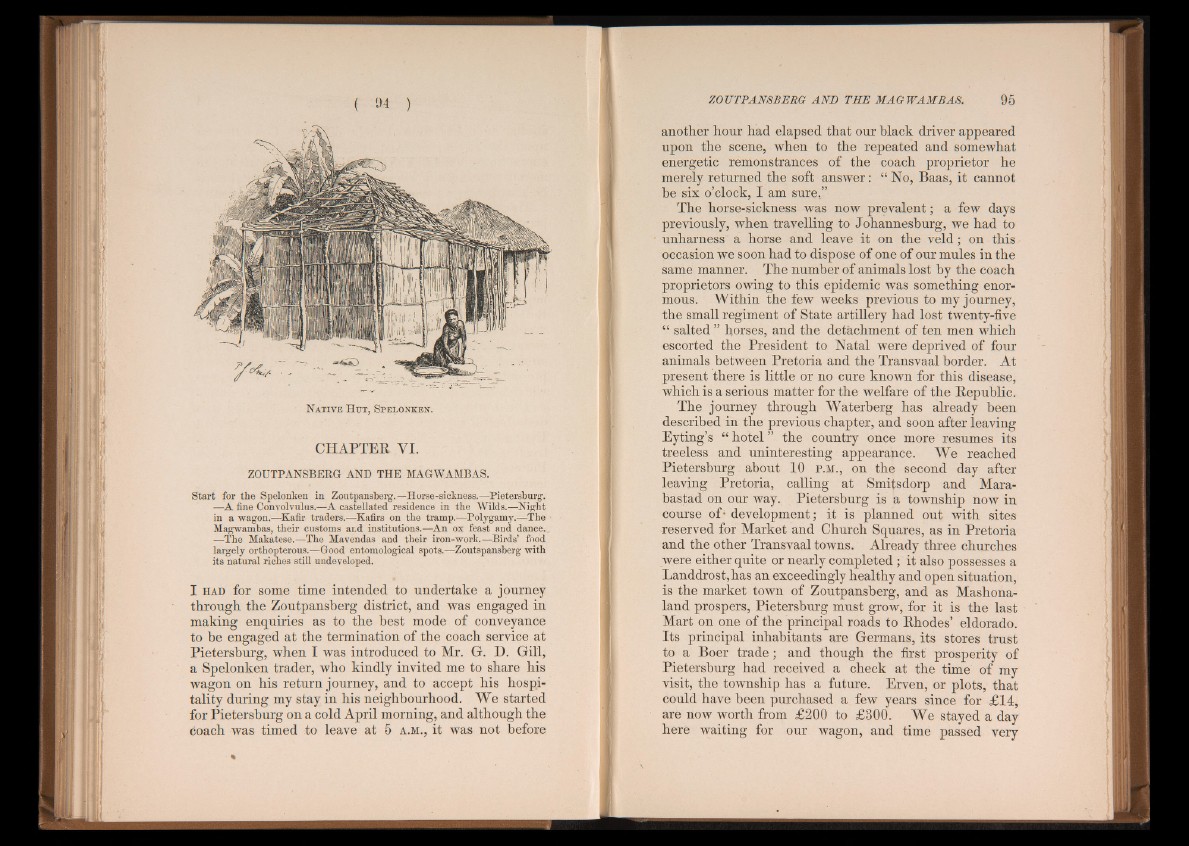
Native H tit, Spe lonken.
CHAPTER YI.
ZOUTPANSBERG AND THE MAGWAMBAS.
Start for the Spelonken in Zoutpansberg.—Horse-sickness.—Pietersburg.
—A fine Convolvulus.—A castellated residence in the Wilds.—Night
in a wagon.—Kafir traders.—Kafirs on the tramp.—Polygamy.—The
Magwambas, their customs and institutions.—An ox feast and dance.
—The Makatese.—The Mavendas and their iron-work.—Birds’ food
largely orthopterous.—Good entomological spots.—Zoutspansberg with
its natural riches still undeveloped.
I ttat) for some time intended to undertake a journey
through the Zoutpansberg district, and was engaged in
making enquiries as to the best mode of conveyance
to be engaged at the termination of the coach service at
Pietersburg, when I was introduced to Mr. G. D. Gill,
a Spelonken trader, who kindly invited me to share his
wagon on his return journey, and to accept his hospitality
during my stay in his neighbourhood. We started
for Pietersburg on a cold April morning, and although the
coach was timed to leave at 5 a .m ., it was not before
%
ZOUTPANSBERG AND T R E MAGWAMBAS. 9 5
another hour had elapsed that our black driver appeared
upon the scene, when to the repeated and somewhat
energetic remonstrances of the coach proprietor he
merely returned the soft answer: “ No, Baas, it cannot
be six o’clock, I am sure,”
The horse-sickness was now prevalent; a few days
previously, when travelling to Johannesburg, we had to
unharness a horse and leave it on the veld; on this
occasion we soon had to dispose of one of our mules in the
same manner. The number of animals lost by the coach
proprietors owing to this epidemic was something enormous.
Within the few weeks previous to my journey,
the small regiment of State artillery had lost twenty-five
“ salted ” horses, and the detachment of ten men which
escorted the President to Natal were deprived of four
animals between Pretoria and the Transvaal border. At
present there is little or no cure known for this disease,
which is a serious matter for the welfare of the Republic.
The journey through Waterberg has already been
described in the previous chapter, and soon after leaving
Eyting’s “ hotel ” the country once more resumes its
treeless and uninteresting appearance. We reached
Pietersburg about 10 p .m., on the second day after
leaving Pretoria, calling at Smitsdorp and Mara-
bastad on our way. Pietersburg is a township now in
course of - development; it is planned out with sites
reserved for Market and Church Squares, as in Pretoria
and the other Transvaal towns. Already three churches
were either quite or nearly completed ; it also possesses a
Landdrost,has an exceedingly healthy and open situation,
is the market town of Zoutpansberg, and as Mashona-
land prospers, Pietersburg must grow, for it is the last
Mart on one of the principal roads to Rhodes’ eldorado.
Its principal inhabitants are Germans, its stores trust
to a Boer trade; and though the first prosperity of
Pietersburg had received a check at the time of my
visit, the township has a future. Erven, or plots, that
could have been purchased a few years since for £14,
are now worth from £200 to £300. We stayed a day
here waiting for our wagon, and time passed very